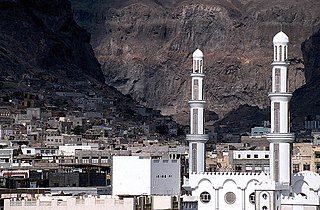
Aden is a port city located in Yemen in the southern part of the Arabian peninsula, positioned near the eastern approach to the Red Sea. It is situated approximately 170 km east of the Bab-el-Mandeb strait and north of the Gulf of Aden. With its strategic location on the coastline, Aden serves as a gateway between the Red Sea and the Arabian Sea, making it a crucial maritime hub connecting Africa, Asia, and the Middle East. As of 2023, Aden City has a population of approximately 1,080,000 residents, making it one of the largest cities in Yemen. Aden is divided into eight districts: Tawahi, Mualla, Crater, Khur Maksar, Al Mansura, Dar Sad, Sheikh Othman, and Al Buraiqa. These form today's Aden Governorate. During British Colonialism, Aden referred to the area along the north coast of the Gulf of Aden, encompassing Tawahi, Mualla, Crater, and much of Khur Maksar District. The western harbor peninsula, known as Little Aden, now falls within the Al Buraiqa District.
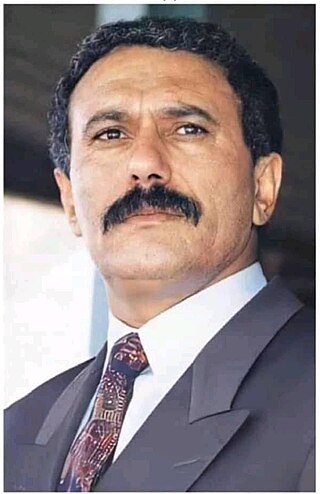
Ali Abdullah Saleh al-Ahmar was a Yemeni politician who served as the first President of the Republic of Yemen, from Yemeni unification on 22 May 1990, to his resignation on 27 February 2012, following the Yemeni revolution. Previously, he had served as the fourth and last President of the Yemen Arab Republic, from July 1978 to 22 May 1990, after the assassination of President Ahmad al-Ghashmi. al-Ghashmi had earlier appointed Saleh as military governor in Taiz.

South Yemen, officially the People's Democratic Republic of Yemen, abbreviated to Democratic Yemen, was a state that existed from 1967 to 1990 as the only communist state in the Middle East and the Arab world. It was made up of the southern and eastern governorates of the present-day Republic of Yemen, including the island of Socotra. It was bordered by North Yemen to the north-west, Saudi Arabia to the north, and Oman to the east.
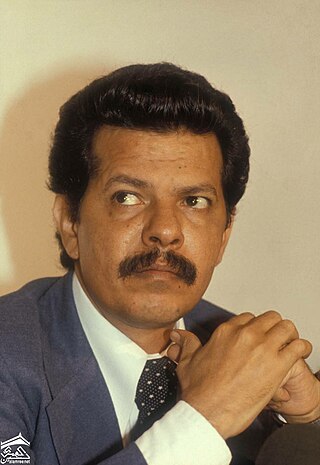
Abdul Fattah Ismail Ali Al-Jawfi was a Yemeni Marxist politician and revolutionary who was the de facto leader of South Yemen from 1978 to 1980 after the overthrow of President Salim Rubaya Ali. He served as Chairman of the Presidium of the Supreme People's Council and founder, chief ideologue and first leader of the Yemeni Socialist Party from 21 December 1978 to 21 April 1980. He died under mysterious circumstances during the 1986 South Yemen Civil War and his body was never found.

Abdul Latif Dayfallah was a Yemeni military officer and politician who served as the Prime Minister of the Yemen Arab Republic during the North Yemen Civil War. He joined the North Yemeni Army in the 1950s and received military training at the Egyptian Military Academy in Cairo where he acquired Nasserist sympathies. At the time of the September 1962 coup, he held the rank of Major General and served as Director of Signals in the Yemeni military. He held several ministerial posts, such as minister of interior and minister of finance. He lived in Lebanon from 1966 to 1967. Dayfallah also served as acting prime minister for nine days in January 1975. Dayfallah died in March 2019 at the age of 90.
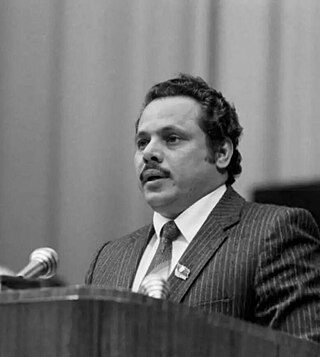
Ali Nasir Muhammad Al-Husani is a Yemeni former politician and leader of South Yemen who served as General Secretary of the Yemeni Socialist Party between 1980 and 1986. He was twice president of South Yemen and once the Prime Minister. He served as the Prime Minister from 2 August 1971 until 14 February 1985 and as Chairman of the Presidential Council from 26 June 1978, after the ouster and execution of Salim Rubai Ali, until 27 December 1978.

Jarallah Omar al-Kuhali was a Yemeni politician, intellectual, and guerrilla fighter.

The Yemeni Socialist Party is a social democratic political party in Yemen. A successor of Yemen's National Liberation Front, it was the ruling party in South Yemen until Yemeni unification in 1990. Originally Marxist–Leninist, the party has gradually evolved into a social democratic opposition party in today's unified Yemen.

The modern history of Yemen began with the withdrawal of the Ottoman Empire. In 1839 the British set up a protective area around the southern port of Aden and in 1918 the northern Kingdom of Yemen gained independence from the Ottoman Empire. North Yemen became a republic in 1962, but it was not until 1967 that the British Empire withdrew from what became South Yemen. In 1970, the southern government adopted a communist governmental system. The two countries were officially united as the Republic of Yemen on May 22, 1990.

The Aden Emergency, also known as the 14 October Revolution or as the Radfan Uprising, was an armed rebellion by the National Liberation Front (NLF) and the Front for the Liberation of Occupied South Yemen (FLOSY) against the Federation of South Arabia, a British Protectorate of the United Kingdom, which led to the proclamation of the People's Republic of South Yemen.
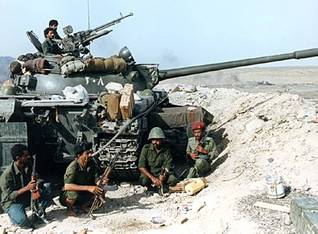
The Yemeni civil warof 1994, also known as the 1994 Summer War, was a civil war fought between the two Yemeni forces of the pro-union northern and the socialist separatist southern Yemeni states and their supporters. The war resulted in the defeat of the southern separatists and the reunification of Yemen, and the flight into exile of many leaders of the Yemeni Socialist Party (YSP) and other separatists.
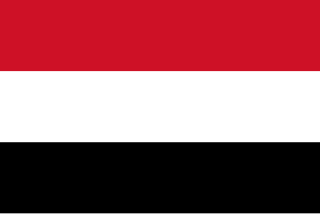
The National Liberation Front was a Marxist–Leninist paramilitary organization and a political party operating in the Federation of South Arabia, during the Aden Emergency. During the North Yemen Civil War, fighting spilled over into South Yemen as the British attempted to establish an autonomous colony known as the Federation of South Arabia. Following the exit of the British armed forces, the NLF seized power from its rival, the Arab nationalist Front for the Liberation of Occupied South Yemen (FLOSY) (FLOSY). In the aftermath of the Emergency, the NLF renamed itself the National Front and eventually became the main force behind the creation of the Yemeni Socialist Party, which subsequently governed the country as a single-party Marxist–Leninist state.

Abdrabbuh Mansur Hadi is a Yemeni politician and former field marshal of the Yemeni Armed Forces who served as the president of Yemen from 2012 until 2022, when he stepped down and transferred executive authority to the Presidential Leadership Council, with Rashad al-Alimi as its chairman. He was the vice president to Ali Abdullah Saleh from 1994 to 2012.
Jalal Ibrahim Abdullah Faqira is a Yemeni politician and diplomat. He has been serving as the ambassador of Yemen to Jordan since 3 April 2023. In 2011 he quit his position as a central committee member over the Yemeni uprising. He is a political scientist at Sanaa University.

The South Yemen civil war, colloquially referred to in Yemen as the events of '86, the events of January 13, or simply as the events, was a failed coup d'etat and brief civil war which took place on January 13, 1986, in South Yemen. The civil war developed as a result of ideological differences, and later tribal tensions, between two factions of the ruling Yemeni Socialist Party (YSP), centred on Abdul Fattah Ismail's faction, at-Toghmah, and Ali Nasir Muhammad's faction, az-Zomrah, for the leadership of the YSP and South Yemen. The conflict quickly escalated into a costly civil war that lasted eleven days and resulted in thousands of casualties. Additionally, the conflict resulted in the demise of much of the Yemeni Socialist Party's most experienced socialist leadership cadre, contributing to a much weaker government and the country's eventual unification with North Yemen in 1990.
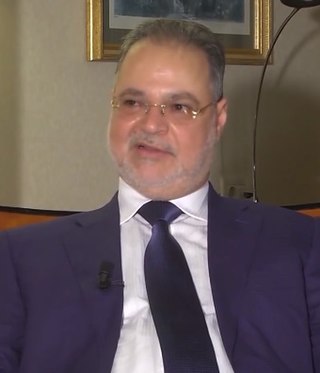
Abdulmalik Abduljalil Al-Mekhlafi is a former Advisor to the president of the Republic of Yemen. He formerly served as Deputy Prime Minister and Foreign Minister.

Mohammed Nasser al-Atifi is a Yemeni military officer who serves as the Defence Minister of the Houthi-led government in Yemen, a position he has served since 28 November 2016.
Ahmed Abd Al Rahman Al Moulami (2004-1917) was a Yemeni writer, born in Utmah, in the Dhamar Governorate, currently. He was a member of the Poetry Society of the Arab Writers Union in Syria, and a member of the Yemeni Writers Union. He received his first education in his village. He memorized the linguistic and jurisprudential text and then moved to Irian village, and learn from its scholars, then moved to Sana’a, where he attended the science and literature councils. He served as ambassador of Yemen to Egypt, then ambassador of Yemen to the State of Ethiopia. He was politically active in opposing hukm al'ayima and supported the revolutionaries, which exposed him to imprisonment twice for eight years and had to flee to Egypt for a period until the declaration of the establishment of the Republic of Yemen in 1962 and the outbreak of the North Yemen Civil War.
Hussein Abdullah Al-Amri is a Yemeni diplomat and writer. He served as ambassador of Yemen to the United Kingdom from 1995 to 2001.















